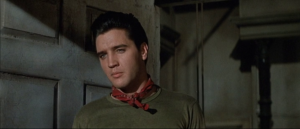
As I wrote about in my last post, I write reviews of nearly every type of film possible (at least those made between 1912 and 1987) for a different blog site. That includes silent films, westerns, romances, foreign films, classics, cult favorites, sci-fi, concert films, experimental movies, and so much more.
I never know what I’ll stumble onto as I check off new titles on my list from that book. Some are deadly boring and make me despair for the time I’m wasting; others are interesting glimpses into cultural and racial tensions from a (fairly recent) historical perspective; and some simply surprise me by including dialogue that seems to come out of nowhere.
Like Wild in the Country, an Elvis Presley flick made in 1961.
I’ve watched nearly every other Elvis Presley title listed in Guide for the Film Fanatic, and am not particularly a Presley fan, so I wasn’t expecting much from this one. It’s about a misunderstood, troubled “country boy” named Glenn who goes to work for his scheming uncle rather than to the penitentiary after being goaded into fighting (and nearly killing) his bullying brother. Part of his “treatment” is seeing a beautiful therapist named Mrs. Sperry (played by Hope Lange), who sees the hope and promise in Glenn that he’d rather not acknowledge.
All of a sudden I heard this dialogue being exchanged:
Mrs. Sperry: “Surely, Glenn, you realize you’re gifted.”
Glenn: “I don’t care to be gifted. It’s too hard. It’s too much work. A person who’s gifted gets knocked around, and I’ve been knocked around enough.”
Mrs. Sperry: “If we were all afraid to be knocked around, there’d be no great men. We’d have no scholars, no scientists, no artists, no movers and shakers – those who overcome handicaps, who live to move and shake the world, shake it out of its alligator sleep and move people up and out of the swamps!”
Well, what do you know? The movie (scripted by Clifford Odets) is based on the debut novel of J.R. Salamanca, and one imagines he probably knew a thing or two about this subject. Even if the gendered language is exclusionary (“great men“? so 1950s!), it’s easy enough to simply see this as a product of its time, and feel gratitude for yet another source of confirmation that the “problem” of giftedness has been around for awhile.
In fact, this sequence made me think about my work related to education in prison – a project close to my heart, but one that’s mostly on hold right now given COVID-19 and lack of access to incarcerated populations.
For now, I’ll just say that I’ve been astonished how many “rainforest minds” I’ve encountered when working in the local men’s facilities. In fact, I even recommended Prober’s book to one student (SO clearly a gifted – if deeply troubled – man) who was close to release; my hope was that he would find solace in it as he navigates his way out in the Free World, with all its complications.
(I’ll write more about the topic of education in prison in another post.)
Until then… I need to see what happens to Glenn:
- Will he acknowledge and embrace his rainforest mind, and publish the short story he’s shared with his therapist?
- Or will he stay mired in guilt over his mother’s early death, and the fact he couldn’t rescue her from an abusive marriage?
I’ll check back in with my review once it’s done.
UPDATE: After falling in love with Mrs. Sperry (a no-no for therapists and their clients) and then accidentally killing someone during a drunken fight (it turns out the victim had chronic heart problems and Glenn wasn’t responsible for his death), Glenn finally realizes that going to college is his best path forward. Interesting how life often does play out that way.
Copyright © 2020 by HalfoftheTruth.org. Please feel free to share with attribution.
